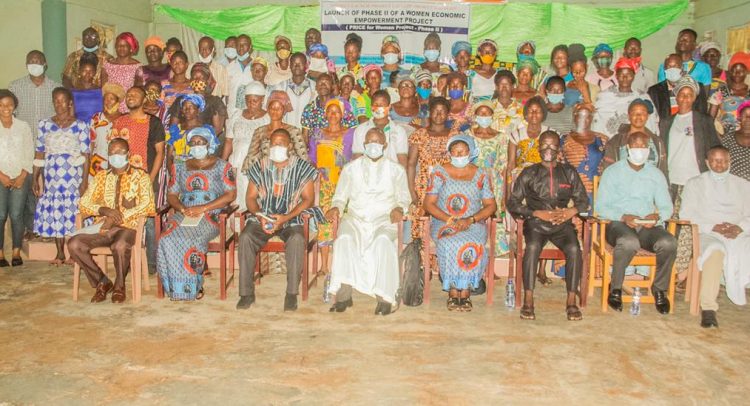The Tamale Archdiocesan Development Office (TADO) has launched its Promoting Resilience for Improved Incomes Through Capacity Enhancement (PRICE) for Women Project.
The project is a women economic empowerment and social inclusion initiative designed to improve women’s access to rural and affordable financial services, financial literacy among Village Savings and Loan Association (VSLA) members, and increase their capacity to undertake sustainable entrepreneurial ventures.
It is also aimed at bridging the inequality gap between men and women in traditional communities in Kpandai in the Northern region.
The PRICE for Women Project was designed and anchored on the transformative principle of the Sustainable Development Goals which stipulates that all development efforts must “ensure no one is left behind”.
The Project is working towards three (3) intermediary objectives to improve access to rural financial services for 1,468 rural women in the Eastern Corridor of Northern Ghana.
It will also improve the capacity of rural women in enterprise development through business planning and workshops to promote gender-sensitive practices towards reducing inequalities.
The Phase I pilot of the PRICE project from 2018 to 2020 targeted 250 women but the number exceeded to 468 at the end of the project.
The Phase II of the PRICE for Women Project is working towards an overall goal of improved access to women economic empowerment opportunities and reduced gender inequalities in traditional communities targeting 1,000 women directly and over 28,000 indirect beneficiaries leading to increased rights, agency, and capacity for decision-making by 2023.
Rev. Fr. Sebastian Zaato, Coordinator of the Tamale Archdiocesan Development Office (TADO), in his speech said after serving as a Priest in Kpandai, he was confronted with challenges facing women in the Eastern Corridor of Northern Ghana and among the pressing issues that confronted women were domestic violence, gender inequality, and lack of access to start-up capital, and stereotyping.
“After a few years of service in Kpandai, I had the opportunity to study in Germany and whilst in Germany I explored funding opportunities to support these women leap out of the socio-economic challenges they were facing. In preparation for my return to Ghana, I presented the challenges of these women to some friends who offered little contributions to support my plans for the Kpandai Catholic women. Upon my return, I mobilized these women into a group and linked them to a credit Union to access these resources in the form of loans with flexible repayment terms.”
According to him, he shared these broad plans with Misereor of Germany leading to the proposal development processes with Misereor committing to support carry out a pilot of the project idea from 2018 to 2020 to enable them to test the efficacy of the project framework.
“TADO was supported with an amount of 50,000 Euros for a two-year pilot project primarily focusing of formation of Village Savings and Loan Association (VSLA) groups and conducting gender sensitization activities to help bridge the inequality gap.”
“The pilot phase of the PRICE for Women Project proved very successful. The Project achieved all its short-term objectives and indicators in excess of 50%. After chalking this level of success under the pilot phase, TADO applied for a second phase of the project targeting many more women and communities. Misereor further supported TADO with an amount of 243,000 Euros for a three (3) year project starting June 2020 to May 2023.”
Rev. Fr. Zaato noted that the PRICE for Women Project does not discriminate adding that there are beneficiaries from the Muslim and other religious communities aside Catholics.
He thanked the Archbishop; Most Rev. Philip Naameh who is the legal holder of the PRICE for Women Project for his continuous guidance and support for the project as well as Misereor for keeping faith the Catholic Church.
Madam Esther Msiadong on behalf of the beneficiary women thanked the Tamale Archdiocesan Development Office for the PRICE project adding that through the project beneficiaries have been able to manage their finances, manage their homes and take care of their children in school as well as expanding their businesses.
FROM Eric Kombat, Kpandai


